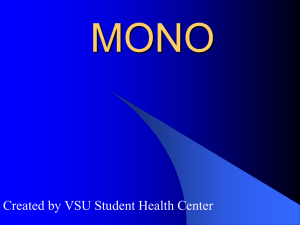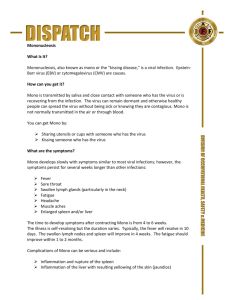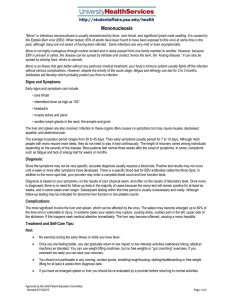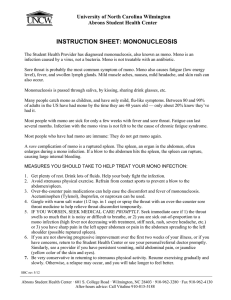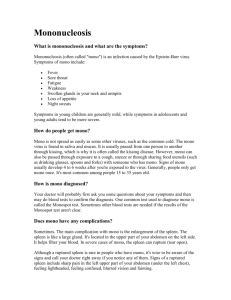questions you should ask concerning infectious mononucleosis
advertisement
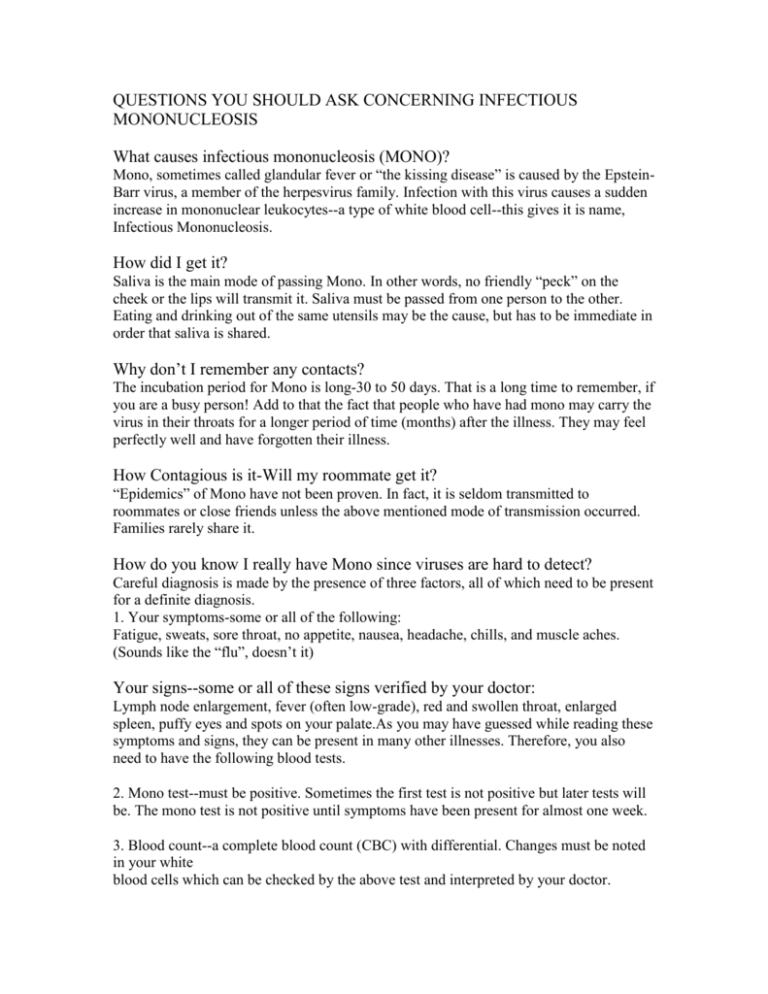
QUESTIONS YOU SHOULD ASK CONCERNING INFECTIOUS MONONUCLEOSIS What causes infectious mononucleosis (MONO)? Mono, sometimes called glandular fever or “the kissing disease” is caused by the EpsteinBarr virus, a member of the herpesvirus family. Infection with this virus causes a sudden increase in mononuclear leukocytes--a type of white blood cell--this gives it is name, Infectious Mononucleosis. How did I get it? Saliva is the main mode of passing Mono. In other words, no friendly “peck” on the cheek or the lips will transmit it. Saliva must be passed from one person to the other. Eating and drinking out of the same utensils may be the cause, but has to be immediate in order that saliva is shared. Why don’t I remember any contacts? The incubation period for Mono is long-30 to 50 days. That is a long time to remember, if you are a busy person! Add to that the fact that people who have had mono may carry the virus in their throats for a longer period of time (months) after the illness. They may feel perfectly well and have forgotten their illness. How Contagious is it-Will my roommate get it? “Epidemics” of Mono have not been proven. In fact, it is seldom transmitted to roommates or close friends unless the above mentioned mode of transmission occurred. Families rarely share it. How do you know I really have Mono since viruses are hard to detect? Careful diagnosis is made by the presence of three factors, all of which need to be present for a definite diagnosis. 1. Your symptoms-some or all of the following: Fatigue, sweats, sore throat, no appetite, nausea, headache, chills, and muscle aches. (Sounds like the “flu”, doesn’t it) Your signs--some or all of these signs verified by your doctor: Lymph node enlargement, fever (often low-grade), red and swollen throat, enlarged spleen, puffy eyes and spots on your palate.As you may have guessed while reading these symptoms and signs, they can be present in many other illnesses. Therefore, you also need to have the following blood tests. 2. Mono test--must be positive. Sometimes the first test is not positive but later tests will be. The mono test is not positive until symptoms have been present for almost one week. 3. Blood count--a complete blood count (CBC) with differential. Changes must be noted in your white blood cells which can be checked by the above test and interpreted by your doctor. If these three factors are not all present, you probably have something else and should have further tests and exams. Your doctor may choose to do other blood tests in addition to the two mentioned and may also do a throat culture. These all will help to individualize treatment. OK, I’ve got it; I feel lousy. What do I do for a quick cure? I’ve got a test tomorrow and a formal this weekend. There is not quick cure or medicinal treatment for Mono. Rest is your one and only cure, and it takes time. Why is that? Just give me some penicillin; that always helps my sore throats. Remember the cause of Mono is the EB virus. A virus is not affected by an antibiotic. Antibiotics are designed for bacterial infections. So, what do I do? Eliminate all extra-curricular activities as much as possible to conserve energy for school. One to three weeks! You’ve got to be kidding! The Mono virus affects your lymph glands, your spleen, and your liver. The process of the disease seems to reach its peak in the second or third week of illness. Considering you spent a while ill before you knew what you had, you may need extra care only one week. Your doctor will tell you how long depending on your symptoms and repeated blood tests. Why so long? Several reasons: 1. You have an infection that affects your whole body. 2. While your body builds antibodies, it needs all of your energy. 3. Spleen changes are always present to some degree making the spleen vulnerable to rupture. 4. Liver functions are usually affected. 5. Complications, although infrequent, can and do occur. What about my classes? What do I tell my teachers? You should contact your teachers. If you wish to sign a release of information form at the health center all instructors will receive official notification of your illness. So this is no little illness. How do I know when I should call the emergency department or the health center for further advice? After your first diagnostic or contact visit, call him if: 1. There is a sudden, severe, unrelieved abdominal pain. 2. You have sufficient trouble swallowing so that you are not eating or drinking anything. 3. You have trouble breathing. 4. You notice a rash. 5. Your skin and/or eyes look yellowish. 6. Your fever goes up above 100 F. after is has been normal for several day. 7. You develop a stiff and painful neck. Will any medicine help? Large doses of Acetominophen (Tylenol,Anacin,Datril, APC, etc.) May overburden your liver. Warm salt water gargle is soothing. If you have strep throat (verified by a throat culture) antibiotics will be ordered. Avoid Ampicillin since it may cause a rash with Mono. Corticosteroid may be ordered for complications. What kinds of things should I eat? A good general diet is fine unless otherwise instructed. You may find that small frequent meals are more appealing. Avoid alcoholic beverages. Plenty of liquids, eight full glasses a day, are important. Keep from getting constipated to avoid straining and possible spleen injury. A one-a-day type of vitamin may be helpful. When I get back to my normal routine, any precautions? Ask you doctor for specifics. Generally, contact sports should be avoided for approximately 2-4 weeks. You should continue to get extra rest and a good diet. Can I get Mono again? No, you will be immune for life. But I have a friend who has had it twice. If you go back to the first three factors, which need to be present to have Mono, they will probably not all have been met. More than one instance of Mono in the same individual may be diagnosed because the blood changes had not returned to normal after a recent case of Mono, or another illness has mimicked some of the symptoms of Mono. A clinically verified (all three criteria of Mono met) second case of Mono has not been recorded. Can my friends be immunized against Mono? There is no vaccine developed to date to immunize against Mono.
